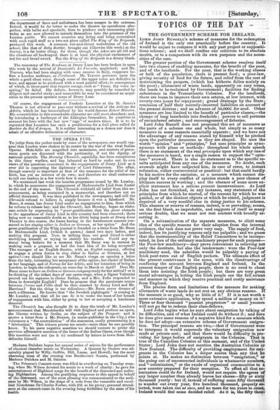THE OPERA FUSS.
To judge from the pother made by some of the newspapers, one would sup- pose that London were shaken to its centre by the war of the rival Italian Operas. Mole-hills are magnified into mountains, and matters of green- room gossip are discussed with the pertinacity, if not the dignity, of national quarrels. The Morning Chronicle, especially, has been conspicuous in this fussy warfare, and has laboured as hard to make out its own Views of the questions concerned in the engagements of Jenny Lind as it ever did in supporting the diplomacy of Lord Palmerston. The affair, though scarcely so important as that of the measures for the relief of the Irish, has yet an interest of its own; and therefore we shall endeavour to tell our readers in a few words how it stands.
We mentioned last week the interim programme issued by Mr. Lumley, in which he announces the engagement of Mademoiselle Lind from Easter to the end of the season. The Chronicle withheld all belief from this an- nouncement, as being contained in a manuscript, and therefore not an official document. It was then published in the newspapers; and still the Chronicle refused to believe it, simply because it was a falsehood. Mr. Bunn, it seems, has Jenny Lind under an engagement to him, from which he refuses to release her; and the Chronicle, last Monday, began an elabo- rate article by expressing its " great gratification that the great obstacle to the appearance of Jenny Lind in this country had been removed; there being now no reasonable doubt as to her debut being made at Drury Lane Theatre in due course, the lessee having in the handsomest manner con- sented to her singing either in Italian or German, at her option." And the great gratification of the Whig journal is founded on a letter from Mr. Bunn to Mademoiselle Lind, (which it quotes,) dated two days before, and making this proposal. Now, in talking thus, our good friend is either stultifying himself, or trying to stultify his readers. Could any ra- tional being believe for a moment that Mr. Bunn was in earnest in making such a proposal, or had the least idea of its being accepted? The manager of an English theatre, with an English company, offering to engage a prima donna to sing either in Italian or German, at her option!—we should like to see Mr. Bunn's visage on opening a letter from the lady, intimating her acceptance of the option; her choice of Italian as her language, and of Norma for her debut; and her intention of being in London, to begin the rehearsals, on some day in March or April! Does Mr. Bunn mean to have an Italian or German company ready for her arrival? or is he thinking of the infant days of our opera-stage, when a Signor Valentini poured out his raptures in choice Italian, and a Mrs. Tofts responded to them in downright English? Does he propose that the passionate scenes between Hernia and Pollio shall be thus enacted by Jenny Lind and Mr. Harrison? But the thing is too ridiculous—Mr. Bunn never dreams of such a dilemma. He knows that " the Swedish nightingale " is coming to Mr. Lumley; and that all he can do is to make the most of her breach of engagement with him, either by going to law or accepting a handsome douceur.
The Chronicle has also thought fit to deny the truth of Mr. Lumley's announcement that Mendelssohn will visit England and produce an opera, the libretto written by Scribe, on the subject of the Tempest: and it quotes a letter from a Mr. Buxton, (a music-publisher in the City,) who volunteers a " flat contradiction " of the statement, coolly pronouncing it a " fabrication." This witness proves too much—more than he can possibly know. To his mere negative assertion we should venture to prefer the previous affirmative assertion of the lessee of the Italian Opera, even though this assertion were not (as it is) confirmed by letters in town from Men- delssohn himself.


































 Previous page
Previous page